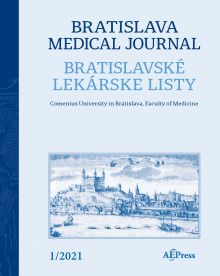Journal info
|
||||
Select Journal
Journals
Bratislava Medical Journal 2024 2023 2022 2021 2020 2019 2018 2017 2016 2015 2014 2013 2012 Ekologia - Ecology Endocrine Regulations General Physiology and Biophysics Neoplasma Acta Virologica Studia Psychologica Cardiology Letters Psychológia a patopsych. dieťaťa Kovove Materialy-Metallic Materials Slovenská hudba 2025Webshop Cart
Your Cart is currently empty.
Info: Your browser does not accept cookies. To put products into your cart and purchase them you need to enable cookies.
Bratislava Medical Journal Vol.125, No.8, p.484–491, 2024 |
||
| Title: Latest advancements in the development of new therapies for type 1 diabetes | ||
| Author: Bakhytzhan ALZHANULY, Kamalidin SHARIPOV | ||
| Abstract: This study aims to explore new treatments for type 1 diabetes that could serve as an alternative or adjunct to insulin therapy. This is a literature review based on a search of relevant scientific articles in PubMed, Scopus, Google Scholar, and Cochrane Library databases. The scrutiny of publications revealed that the introduction of glucagon-like peptide-1 agonists into insulin therapy can improve disease control and reduce the frequency of hypoglycaemic episodes. While immune therapy is pathogenetically justified, its utility is limited in patients with recent onset of type 1 diabetes. It may, however, find application in prophylaxis in individuals at increased risk of developing this type of diabetes. Concurrently, stem cell therapy is under active investigation in clinical trials and has shown promise in reducing insulin dependence, improving β-cell function and controlling glucose levels. In addition, stem cells have demonstrated efficacy in treating complications of diabetes such as diabetic nephropathy, peripheral neuropathy and diabetic angiopathy. There is compelling evidence supporting the significant potential of gene-editing technology. Intravenous administration of T-regulatory cells, as one method of cell therapy, shows potential in stabilising the course of diabetes and slowing its progression. However, further research is warranted to confirm efficacy. While gene therapy holds promise, much of its research is currently in the preclinical stage. Further development of innovative therapies for type 1 diabetes has the potential to enhance the quality of life of patients, improve disease control and prevent the development of complications (Fig. 1, Ref. 54). |
||
| Keywords: diabetes type 1, treatment, cell therapy, insulin, pancreatic β-cells | ||
| Published online: 17-Jun-2024 | ||
| Year: 2024, Volume: 125, Issue: 8 | Page From: 484, Page To: 491 | |
| doi:10.4149/BLL_2024_75 |
||
|
|
 download file download file |
|

